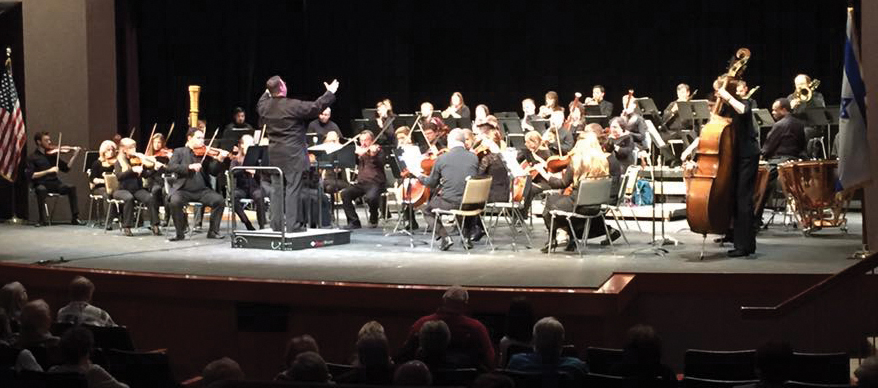
Chris Kelts sometimes likes questions that have no concrete answers.
Kelts is music director of Kinnor Philharmonic, Kansas City’s Jewish orchestra. It will give the first public performance of German composer Marcel Tyberg’s final two movements of Franz Schubert’s “Symphony No. 8 (Unfinished)” at a concert titled “Unanswered, Unfinished, Unheard” at 3 p.m. Sunday, June 10, at the White Theatre at the Jewish Community Center of Greater Kansas City (The J).
The concert will open with composer Charles Ives’ “Unanswered Question.” Then it will move to a multimedia presentation by Kelts about Schubert’s symphony; an intermission; a performance of Schubert’s symphony; and finally a performance of Tyberg’s final two movements of it.
Tyberg wrote the final two movements of Schubert’s symphony in 1928 for a Deutsche Gramophone competition, which he didn’t win, and his composition was never publicly performed. Through The OREL Foundation, which collects and performs suppressed music of the Third Reich, Tyberg’s original manuscript was discovered.
Tyberg, who was 1/16th Jewish, was born in Austria in 1893 and died in the Auschwitz concentration camp in 1944. A biography of him is available at orelfoundation.org/composers/article/marcel_tyberg.
Kelts always likes to have a Jewish connection to the two concerts Kinnor performs each year, on New Year’s Day and in early June. The orchestra incorporated an educational element to its summer concerts starting a few years ago, and he wants to continue that with this year’s summer concert.
Kelts also is an assistant professor and director of orchestral studies at Missouri State University in Springfield, music director of the Kansas City Civic Orchestra and co-artistic director of ProjectMusica.
“To be honest with you, I have no idea whether this is going to be good music, if it’ll be a demonstration of Tyberg’s real talent or if it’s going to sound experimental in nature,” Kelts said.
The orchestra will start rehearsing on June 6 at the White Theatre, so an answer to that question likely will start to emerge then.
“I think the third movement is (based on) a lot of Schubert’s own material, sketches and ideas,” he said. “But this last movement is all Tyberg, and it sounds like it’s going to end with a full, exciting sound. But hearing it in your mind is never exactly what it is when you (actually) hear it.
“I think the real test here is we’re going to play the two Schubert movements, no clapping and go right into the third movement,” he said. “It’s kind of brave of Tyberg to take this on.”
The concert will be a way for Kinnor to pay tribute to Tyberg’s memory, Kelts said.
“Schubert was such a tour de force composer — his music has stood the test of time,” he said. “He was almost a contemporary of Beethoven. It’s ironic that Tyberg, having worked most of his very short life in the 20th century, his music is just now beginning to see daylight, in a way.”
It’s unknown why Schubert didn’t finish “Symphony No. 8,” Kelts said, and he thinks “it’s sort of interesting because it’s a fantasy.”
“What would it be like with the other two movements?” he said. “It’s said that, where there are two conductors, there are three opinions” — akin to the old saying, “Ask two Jews and you’ll get three opinions.”
Kelts’ motivation to continue doing his work comes from his conviction that he was meant to do it, “to study and create music as best I can.”
“I love being daunted by how much I can research and know, and then turn around and realize I know nothing,” he said. “I enjoy helping students mold their talent. That’s what got me into this in the first place: great teachers. It’s not the money.”
Kelts and Robin Onikul founded Kinnor Philharmonic in 2011. Onikul is president of its board of directors and plays second oboe in the orchestra.
The word “kinnor” in biblical Hebrew refers to a harp or lyre. In Modern Hebrew, it means violin.
Kinnor Philharmonic typically has 45 to 55 musicians — a mix of Jews and non-Jews — and it plays a wide variety of music.
Kelts was born and raised in St. Louis. He moved to Kansas City in 2005 to start working on his doctorate in conducting at the Conservatory of Music and Dance at the University of Missouri-Kansas City. He is a violist by trade but decided in 2002 to switch to conducting.
From 2010 to 2015, he was director of orchestras at Washburn University in Topeka. He became director of orchestral studies at Missouri State University in 2015.
He and his wife, Maureen, were members of Congregation Ohev Sholom while they lived in the Kansas City area.
The importance of “Unanswered, Unfinished, Unheard” from a Jewish perspective, Kelts said, is that, in the context of Holocaust Remembrance Day, it gives Jewish and non-Jewish audiences an opportunity to remember Tyberg.
“In Judaism, when someone passes away, you might say their name followed by ‘of blessed memory,’ and this is the way we can do that for Tyberg,” he said. “Ives and Schubert are known in the classical music world. Tyberg is just becoming known. This is maybe a tribute to Tyberg’s soul. He suffered terribly in his life, was very impoverished and surrounded by the death of his family, and he died in Auschwitz.”
Kelts wants the audience to leave the concert with more questions than they have answers.
“I want them asking themselves: What is it that makes Schubert’s unfinished symphony so great, and why did or didn’t I like this? Why does Ives’ music sound different to me? I also want the audience to feel proud of the orchestra and that they’re in a community that gets the opportunity to hear these two Tyberg pieces, as well.”


